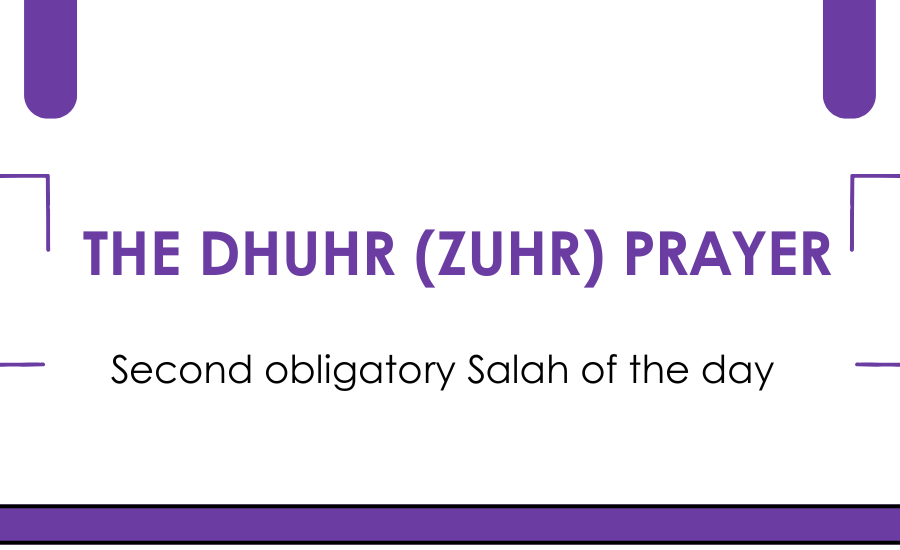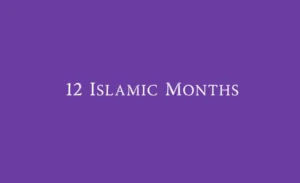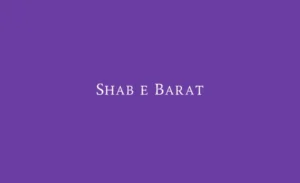The Dhuhr (Zuhr) prayer is the second obligatory salah (namaz) of the day and holds immense spiritual, moral, and psychological significance in Islam. It is offered after the sun has passed its zenith (midday) until just before the time of Asr prayer. This sacred time marks a transition in the day, when the world pauses from its hustle, and the believer turns to Allah in remembrance, gratitude, and submission.
The Dhuhr prayer is a powerful reminder that no matter how busy life becomes, true peace and success lie in prioritizing our connection with Allah. The Prophet Muhammad (peace and blessings be upon him) emphasized Dhuhr as a moment of divine tranquility and reward. It not only purifies one’s heart from worldly distractions but also recharges the soul for the rest of the day.
In today’s fast-paced world, when many people are consumed by work, studies, or social engagements, the Dhuhr salah becomes a spiritual oasis, a time to realign with faith, seek forgiveness, and find inner calm. It also acts as a shield against sins and temptations, as the Prophet (PBUH) said:
“The five daily prayers are an expiation for the sins committed between them, so long as major sins are avoided.” – (Sahih Muslim 233)
Thus, performing Dhuhr consistently is not merely a religious duty but a divine prescription for peace, discipline, and success. It anchors a Muslim’s day in faith, reminding us that amid all worldly pursuits, Allah remains our ultimate purpose and priority.
Meaning and Timing of Duhr Prayer
The word Duhr (Zuhr) literally means midday. It is the time when the sun declines from its highest point in the sky until the shadow of an object becomes equal to its length. This prayer reminds us that even in the busiest hours of the day, Allah must come first. Allah (SWT) commands in the Quran:
اَقِمِ الصَّلٰوةَ لِدُلُوكِ الشَّمْسِ اِلٰى غَسَقِ الَّيْلِ وَقُرْاٰنَ الْفَجْرِ ۖ اِنَّ قُرْاٰنَ الْفَجْرِ كَانَ مَشْهُوْدًا
Transliteration: Aqimis salata liduluki shamsi ila ghasaqil laili wa quranal fajr, inna quranal fajri kana mashhudan.
Translation: “Establish prayer at the decline of the sun until the darkness of the night, and [also] the recitation of dawn. Indeed, the recitation of dawn is ever witnessed.” (Surah Al-Isra 17:78)
This ayah includes the Duhr prayer as part of the command to maintain regular Salah from noon to night. The Dhuhr (Zuhr) prayer marks the start of the afternoon worship, reminding believers to pause and reconnect with their Creator amid daily tasks. It signifies obedience and gratitude during the busiest part of the day, anchoring one’s schedule around remembrance of Allah. This sacred timing reflects balance between worldly duties and spiritual devotion, as commanded in the Quran.
Number of Rakats in Duhr (Zuhr) Prayer
The Duhr prayer consists of a total of 12 rakats (including Sunnah and Fard):
- 4 Sunnah (Muakkadah): highly emphasized Sunnah
- 4 Fard (Obligatory): mandatory part of the prayer
- 2 Sunnah (Muakkadah): emphasized Sunnah after the Fard
- 2 Nafl (Voluntary): optional but greatly rewarding
Performing these Sunnah rakats brings immense spiritual benefit and closeness to Allah. The Prophet Muhammad (peace be upon him) said:
مَنْ صَلَّى أَرْبَعًا قَبْلَ الظُّهْرِ وَأَرْبَعًا بَعْدَهَا حَرَّمَهُ اللَّهُ عَلَى النَّارِ
Transliteration: Man salla arba’an qabla az-zuhr wa arba’an ba’daha harramahu Allahu ala an-nar.
Translation: “Whoever prays four rakats before Duhr and four after it, Allah will forbid him to the Fire.” – (Sunan al-Tirmidhi 428)
This hadith highlights the tremendous reward and protection for those who maintain Duhr regularly with its Sunnah prayers.
Virtues and Rewards of Duhr (Zuhr) Prayer
Performing the Dhuhr (Zuhr) prayer brings immense blessings, forgiveness, and tranquility to the believer’s heart. It serves as protection from the fire of Hell and draws a person closer to Allah’s mercy. Those who guard their Dhuhr prayer are promised ease, sustenance, and success in both this world and the Hereafter.
1. A Shield from Hellfire
The Messenger of Allah (PBUH) stated:
لَنْ يَلِجَ النَّارَ أَحَدٌ صَلَّى قَبْلَ طُلُوعِ الشَّمْسِ وَقَبْلَ غُرُوبِهَا
Transliteration: Lan yalij an-nar ahad salla qabla tuloo’ish shams wa qabla ghuroobiha.
Translation: “No one will enter Hell who prays before sunrise and before sunset.” – (Sahih Muslim 634)
This hadith highlights the power of consistent and timely prayer as a shield from the fire of Hell. While it directly mentions Fajr and Asr, the message extends to all daily prayers, including Dhuhr, which serves as a safeguard for the soul. Regularly observing these prayers keeps a believer under Allah’s mercy and away from eternal punishment.
2. Forgiveness of Sins
The Dhuhr prayer acts as a divine purifier, wiping away the minor sins committed between one Salah and the next. When performed with sincere wudu, humility, and full concentration, it brings spiritual renewal and inner peace. Each Dhuhr prayer becomes a fresh start, cleansing the heart and strengthening one’s bond with Allah.
مَا مِنْ مُسْلِمٍ تَحْضُرُهُ صَلَاةٌ مَكْتُوبَةٌ فَيُحْسِنُ وُضُوءَهَا وَخُشُوعَهَا وَرُكُوعَهَا إِلَّا كَانَتْ كَفَّارَةً لِمَا قَبْلَهَا
Transliteration: Ma min muslimin tahduruhu salatun maktubah fayuhsinu wudu’aha wa khushu’aha wa ruku’aha illa kanat kaffaratan lima qablaha.
Translation: “Whenever a Muslim performs a prescribed prayer properly, with good wudu, humility, and bowing, it becomes an expiation for sins committed since the previous one.” – (Sahih Muslim 228)
Regular Duhr prayer serves as a means of forgiveness and purification, cleansing the heart and soul from minor sins committed between prayers.
3. Bringing Barakah and Peace in Work and Life
Duhr falls during the peak of the day when one is most occupied with worldly affairs. Taking a pause for Salah renews energy, focus, and blessings. It teaches discipline and keeps the heart alive with remembrance (dhikr) of Allah. The Prophet (PBUH) said:
“The most beloved deeds to Allah are those performed regularly, even if they are small.” – (Sahih Bukhari 6464)
Thus, maintaining Duhr daily brings barakah in time, work, and sustenance. Observing the Dhuhr prayer during the busiest hours of the day invites immense barakah (blessings) into one’s time, work, and livelihood. This sacred pause strengthens focus, calms the heart, and aligns worldly efforts with divine purpose. Consistency in Dhuhr not only pleases Allah but also fills daily life with peace, productivity, and spiritual fulfillment.
Special Duas and Adhkar After Dhuhr Prayer
The moments following Dhuhr Salah are among the most blessed times to engage in dhikr (remembrance of Allah) and make heartfelt dua (supplication). After completing the prayer, a believer’s heart is calm, sins are lightened, and the gates of mercy are open, making it an ideal time to connect with Allah through words of gratitude, repentance, and praise.
The Prophet Muhammad (peace and blessings be upon him) strongly encouraged regular remembrance after every obligatory prayer. This act not only multiplies reward but also fills the heart with tranquility and strengthens one’s bond with Allah.
1. The Famous Tasbeeh after Every Salah
The Messenger of Allah (PBUH) told everyone to narrate:
سُبْحَانَ اللَّهِ 33، الْحَمْدُ لِلَّهِ 33، اللَّهُ أَكْبَرُ 34
Transliteration: SubhanAllah 33, Alhamdulillah 33, Allahu Akbar 34.
Translation: “Whoever says SubhanAllah (Glory be to Allah) 33 times, Alhamdulillah (Praise be to Allah) 33 times, and Allahu Akbar (Allah is the Greatest) 34 times after each prayer, his sins will be forgiven even if they are like the foam of the sea.” – (Sahih Muslim 597)
This simple yet powerful dhikr cleanses the heart, erases minor sins, and earns immense reward. It is a spiritual way to close the prayer with remembrance that lingers throughout the day.
2. Reciting Ayat al-Kursi after Salah
The Prophet (PBUH) also said:
“Whoever recites Ayat al-Kursi after every obligatory prayer, nothing stands between him and Paradise except death.” – (Sunan An-Nasa’i 992)
Ayat al-Kursi (Surah Al-Baqarah 2:255) is one of the most powerful verses in the Quran. Reciting it after Dhuhr provides divine protection, strengthens faith, and shields a believer from evil until the next prayer.
3. Making Personal Dua after Dhuhr
After performing dhikr, one should take a few moments for personal supplication. This is a spiritually charged time when the heart is softened by prayer. A believer may ask for:
- Forgiveness of sins.
- Guidance and steadfastness in faith.
- Barakah (blessing) in time, wealth, and health.
- Protection from trials, envy, and laziness in worship.
The Prophet (PBUH) said:
“Your Lord is Modest and Generous. He is shy when His servant raises his hands to Him to return them empty.” – (Sunan Abi Dawood 1488)
Thus, after Dhuhr, raise your hands, speak to Allah with sincerity, and trust that He hears every whisper of the heart.
4. Example of a Comprehensive Dhikr Routine after Dhuhr
To help readers practically adopt this Sunnah, you can recommend this sequence:
- Say Astaghfirullah (I seek forgiveness from Allah) three times.
- Recite Ayat al-Kursi (2:255).
- Say SubhanAllah 33 times, Alhamdulillah 33 times, Allahu Akbar 34 times.
- Recite Surah Al-Ikhlas, Al-Falaq, and An-Nas once each for protection.
- Make personal dua for one’s needs, family, and Ummah.
This complete routine takes only a few minutes but brings massive spiritual benefit, peace of mind, and divine reward.
5. The Spiritual Impact of Dhikr after Dhuhr
Engaging in dhikr after Dhuhr refocuses the believer’s mind and soul in the middle of the day. It removes anxiety, increases gratitude, and infuses the heart with serenity. Modern psychology also supports that mindful repetition and gratitude lower stress, something Islam perfected 1,400 years ago through daily remembrance.
Arabic: اَلَا بِذِكْرِ اللّٰهِ تَطْمَئِنُّ الْقُلُوْبُ
Transliteration: Ala bidhikri Allahi tatmainnul quloob.
Translation: “Surely, in the remembrance of Allah do hearts find peace.” – (Surah Ar-Ra’d 13:28)
By making dhikr and dua after Dhuhr a consistent habit, a believer not only gains forgiveness and peace but also ensures that every prayer becomes a means of growth, gratitude, and nearness to Allah.
Scientific and Psychological Benefits of Duhr Prayer
Modern science confirms the physical and mental health benefits of pausing at midday for calm, reflection, and gentle movement.
- Stress Reduction: Performing Salah at Duhr lowers stress hormones and resets focus, promoting inner peace.
- Improved Circulation: The physical postures of prayer improve blood flow and muscle flexibility after long sitting hours.
- Mental Refreshment: Taking a spiritual break in the middle of the day boosts concentration and productivity.
- Balance in Lifestyle: Regular Salah maintains a healthy routine, balancing worldly and spiritual needs.
This synchronization between spiritual duty and natural body rhythm shows that Islam is a holistic way of life, nurturing both soul and body.
Wisdom behind Duhr Prayer
Duhr prayer symbolizes submission at the height of human activity. When the sun is at its strongest and people are immersed in their work, the believer pauses to stand before the Almighty. This action reflects the essence of Islam, that nothing is more important than the remembrance of Allah.
يَا أَيُّهَا الَّذِينَ آمَنُوا ارْكَعُوا وَاسْجُدُوا وَاعْبُدُوا رَبَّكُمْ وَافْعَلُوا الْخَيْرَ لَعَلَّكُمْ تُفْلِحُونَ
Transliteration: Ya ayyuhalladhina amanu irka’u wasjudu wa’budu rabbakum waf’alu al-khayra la’allakum tuflihun.
Translation: “O you who believe! Bow down, prostrate yourselves, and worship your Lord, and do good that you may be successful.” – (Surah Al-Hajj 22:77)
Common Mistakes Muslims Make Regarding Duhr Prayer
- Delaying Duhr unnecessarily until the time of Asr approaches.
- Skipping Sunnah rakats, despite their immense reward.
- Neglecting concentration (khushu) and rushing through Salah.
- Missing Duhr due to work or study without making effort to pray on time.
- Not performing it in congregation (Jama’ah) when possible.
These mistakes reduce the spiritual impact of prayer. Duhr should be performed on time and with full focus, as Allah values sincerity over quantity.
Performing Duhr in Congregation (Jama’ah)
Praying Duhr in congregation carries greater spiritual reward and unity among Muslims. The Prophet (PBUH) said:
صَلاَةُ الْجَمَاعَةِ تَفْضُلُ صَلاَةَ الْفَذِّ بِسَبْعٍ وَعِشْرِينَ دَرَجَةً
Transliteration: Salat al-jama’ah tafdulu salat al-fadh bi sab’in wa ‘ishrina darajah.
Translation: “The prayer in congregation is twenty-seven times more rewarding than the prayer offered alone.” – (Sahih Bukhari 645)
By praying Duhr together, believers gain multiplied rewards, strengthen brotherhood, and revive the Sunnah of the Prophet.
How to Develop a Habit of Praying Duhr Regularly
Here are some useful tips:
- Set reminders or alarms around midday to never miss the prayer.
- Plan your work or class schedule with Salah breaks in mind.
- Pray with others whenever possible to maintain consistency.
- Reflect on the meaning of each prayer, to stay spiritually motivated.
Seek Allah’s help by making dua for steadfastness in Salah.
اللهم اجعل قلبي محبا للصلاة ولا تحرمني لذتها
Transliteration: Allahumma aj‘al qalbi muhabbal-lis-salah wa la tahrimni ladhdhataha.
Translation: “O Allah, make my heart love the prayer and do not deprive me of its sweetness.”
Duhr Prayer
The Duhr (Zuhr) prayer is more than a ritual; it is a spiritual pause that refreshes the believer’s heart, mind, and soul. It teaches discipline amidst worldly distraction and brings the worshipper closer to Allah in humility and peace. Those who guard this Salah are promised success in both worlds, as Allah says:
وَالَّذِينَ هُمْ عَلَىٰ صَلَوَاتِهِمْ يُحَافِظُونَ
Transliteration: Walladhina hum ‘ala salawatihim yuhafizun.
Translation: “And those who strictly guard their prayers.” – (Surah Al-Ma’arij 70:34)
Performing Duhr consistently strengthens faith, brings tranquility, and ensures the light of guidance throughout the day.
Frequently Asked Questions (FAQs)
What time is Duhr prayer performed?
Duhr begins after the sun passes its zenith and ends just before Asr begins.
How many rakats are there in Duhr?
A total of 12 rakats: 4 Sunnah, 4 Fard, 2 Sunnah, and 2 Nafl.
Can I pray Duhr at work or school?
Yes. As long as the place is clean and modest, you can perform Salah anywhere.
What is the reward of praying Duhr regularly?
Duhr prayer brings forgiveness of sins, peace, and protection from Hellfire, and blessings in daily affairs.
What if I miss Duhr unintentionally?
You should pray it as soon as you remember, as making up missed prayers (Qada) is encouraged.






